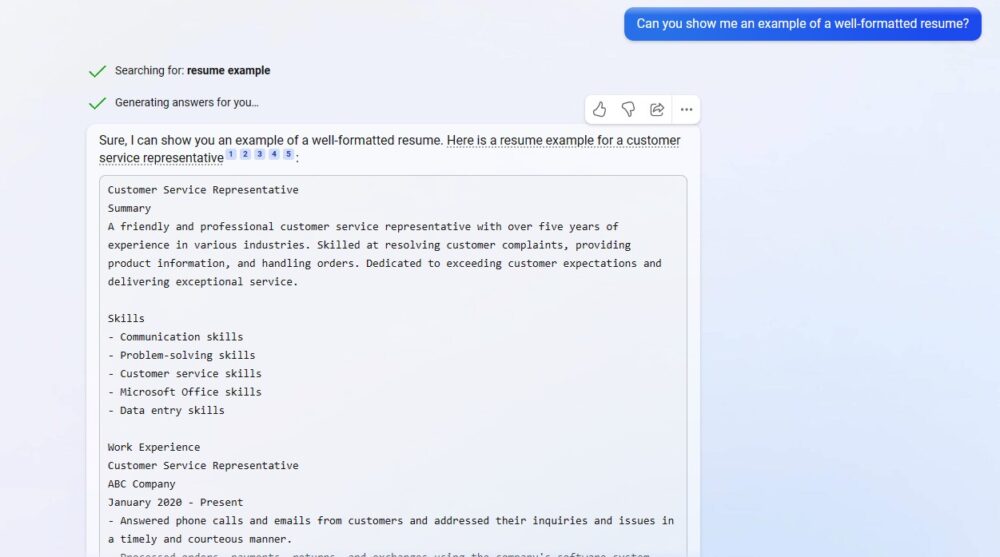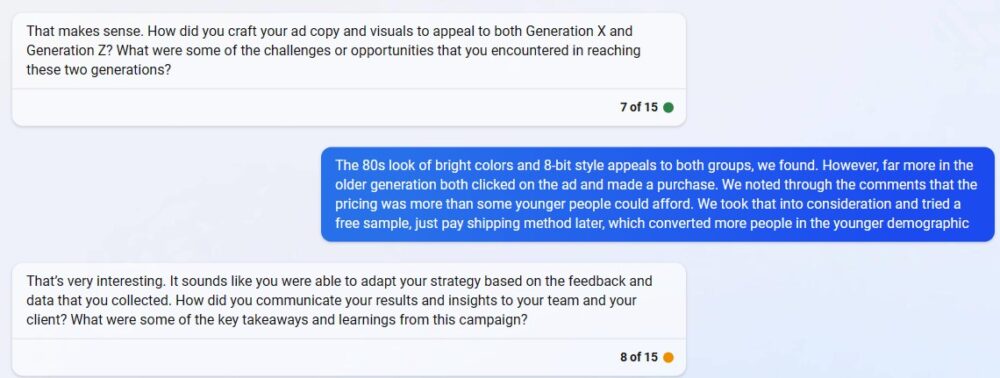ChatGPT — the parent company of which, OpenAI, just released GPT-4 this week — can’t do your job interview for you. It can’t take your place in any of the more nerves-inducing parts of the job application process, either. The tool can help you prepare, though.
As an experiment, this reporter put ChatGPT (in its Bing Chat format, specifically) to the test as a job coach in three areas: job locator, resume writing assistant and mock job interviewer.
I’m not sure what I expected, but it was a more intense experience that I thought it would be. If you ask it to pretend to give you a job interview, it is not going to play around.
Overall, ChatGPT is a better job coach than it is at sniffing out a recruitment scam, which it failed at when I posed as a jobseeker asking about a scam message. I might even say it’s a pretty rigorous job coach, as long as you don’t need the assistance to be highly personalized.
Here’s what happened:
As a job locator
If you want to streamline job search results from Indeed, you’re in luck. ChatGPT credited all of its non-Bing Jobs data to that site.
I first asked how many local job openings there were for a digital marketer. It gave me a number — 310 — then asked if I wanted it to filter it down further. I said sure, filter digital marketing jobs by salary, showing only the jobs making $50,000 or more.

The results decreased dramatically to just 10 job openings. Curious, I asked it what the average local salary as a digital marketer was. The answer was more than $70,000, which made me wonder how accurate the first dataset of 310 jobs was. In any event, it highlighted three jobs, each with the words “digital” and “marketing” in the listing title, then asked if I was interested in applying to any of them.
I picked the first one, and it gave me a job summary and listed the requirements before asking if I wanted help applying for the job. Curious, I said yes. It told me to click a link, create an account, upload a resume and fill out an online form. It offered to help more if I didn’t understand, but I felt like it was time to pretend to complete the application myself.
- The good: It was fast. It found a few openings that matched my request and walked me through what to expect on the job application page.
- The bad: The search seemed limited. Had it consolidated several reliable job search boards and shared them in one list, that would have been more of a time saver. And while it does what you ask, it can’t replace the less mechanical, more effective method of networking.
As a resume assistant
Putting together a resume is pretty simple, but there are challenging details like the summary, and whether there is a preferred order and format to it.
When I asked ChatGPT what I needed to put on my resume, it gave me a detailed bullet point list of tips, including “look for keywords in the job posting and include them in your resume” and “include only relevant information and put it first.” The tips were useful and culled from different sources, but its text description of how the resume should look was a little confusing, so I asked it if it could show me an example of a well-formatted resume.

ChatGPT actually made a quick mockup of a resume with example information. It helped with the content, but lacked a header and things like bolded text. I’d expected it to link me to examples — and it did, in the source links — instead of making one that wasn’t complete.
- The good: The basic advice was solid.
- The bad: The mockup was of no help. A quick search for a resume template with example text is probably just as good when it comes to resume creation.
As a mock interviewer
ChatGPT may have been OK, not outstanding, when it came to job search and resume assistance, but as a mock interviewer, it was relentless. Since I had picked digital marketer for my pretend job search, I told it I was interviewing for a job in that field.
I gave it the basic information about the fake job I was interviewing for. Things started out simple: Why do you want to work here? What are some of the skills you can bring to the role?
The next thing I knew, I was making up a fairly detailed social media advertising campaign, with demographics, budget and its ROI. Every question was a challenge I didn’t see coming for a fake AI interview: What channels did you use? How did you measure the impact? What were the key performance indicators? What were your takeaways?

I faked my way through the answers, for science, until the session hits its limit at 15 questions. It didn’t seen near done grilling me. After saving screenshots of the chat, I swept it away to start a new topic.
“No problem,” it said, with what I swear was a tinge of disappointment in me. “Let’s move on to a new topic.” I was too relieved to not have to keep up the charade to care that I’d blown the fake interview and wasn’t going to land the fake job.
Long story short: If you want to practice interviewing, ChatGPT will make you answer questions about your skills and experience in detail, with examples. It’s good for dusting the cobwebs off of your memories of your “best example” previous projects (which recruiters recommend anyway) and will prepare you for some challenging questions.
In this area, I don’t see a downside for using ChatGPT, though your mileage may vary depending on the industry.







